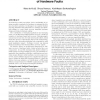102 search results - page 1 / 21 » Fault and adversary tolerance as an emergent property of dis... |
SIGSOFT
2007
ACM
2007
ACM
Fault and adversary tolerance as an emergent property of distributed systems' software architectures
14 years 5 months ago
Fault and adversary tolerance have become not only desirable but required properties of software systems because mission-critical systems are commonly distributed on large network...
ASPLOS
2006
ACM
13 years 10 months ago
2006
ACM
Control-Flow Integrity (CFI) is a property that guarantees program control flow cannot be subverted by a malicious adversary, even if the adversary has complete control of data m...
RTSS
1989
IEEE
13 years 8 months ago
1989
IEEE
A new fault tolerant architecture that provides tolerance to a broad scope of hardware, software, and communications faults is being developed. This architecture relies on widely ...
TCAD
2008
13 years 4 months ago
2008
Safety-critical feedback-control applications may suffer faults in the controlled plant as well as in the execution platform, i.e., the controller. Control theorists design the con...
ISCA
2010
IEEE
13 years 9 months ago
2010
IEEE
As technology scales ever further, device unreliability is creating excessive complexity for hardware to maintain the illusion of perfect operation. In this paper, we consider whe...

